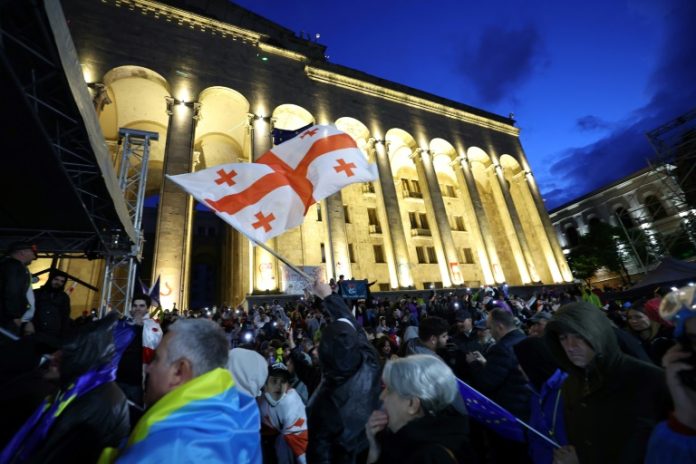The foreign ministers of Estonia, Latvia, and Lithuania led a demonstration against the “foreign agent law” in Georgia.
Thousands of people gathered outside the parliament building to protest the passage of the law on May 14. Government officials and ruling party lawmakers claimed the bill would strengthen the country’s sovereignty. It would allegedly make non-governmental organisations, which played a central role in Georgia’s highly polarised political life, more transparent to the public.
Yet, Georgian parliament approved the draft law on “foreign agents” in the third and final reading. 84 MPs were in favour of the law, while 30 voted against. Georgian President Salome Zourabishvili, who had previously promised to veto it, must now sign the law. However, the parliamentary majority anyway has enough votes to override the head of state’s veto.
Curious parallel between Baltic foreign ministers and Ukrainian crisis
Prior to the Ukraine crisis, the US Undersecretary of State for Political Affairs, Victoria Nuland, who was directly responsible for US and NATO Ukraine policy, travelled to Kyiv in December 2013. She paid a visit with almost the same purpose as Baltic leaders did now: to express support for the troubled country and to promote the principles of democracy.
Then, in 2014, the visit was followed by a coup that resulted in Ukrainian President Viktor Yanukovych resigning from office. The armed conflicts in eastern Ukraine followed, and in March 2014, the country lost Crimea.
Today, the war in Ukraine is entering its third year. Russian troops have intensified their offensive against the backdrop of belated assistance to Kyiv by EU and NATO allies. Russia’s efforts could lead to Ukraine losing Kharkiv as well, the media highlighted.
At the same time, three Baltic foreign ministers come to lead the protesters in Georgia. What this will entail for the future of the country, which wants to become part of the EU, is unclear.
EU and US criticism
US Assistant Secretary of State for European and Eurasian Affairs James O’Brien stated that the US might impose sanctions against Georgian politicians and reconsider aid programmes if the law on “foreign agents” was adopted.
If this law proceeds as it does now – incompatible with EU standards, undermining democracy, restrictions will follow on the part of the US.
O’Brien also emphasised that using violence against peaceful protesters was unacceptable. He called on Georgian politicians to refrain from repressing the protesters. Meanwhile, European Commission spokesman for foreign affairs and security policy Peter Stano claimed that Georgia’s adoption of the “foreign agent” law would be an obstacle on the way to EU membership. Emphasising that Georgia was a candidate for EU membership, he urged the authorities to return to the European path and fulfil all the obligations they had agreed to undertake when they applied for it.
Double standards
However, the US has a similar law introduced in 1938 entitled the Foreign Agents Registration Act (FARA). It requires certain agents of foreign principals who engage in political or other activities specified in the act to disclose publicly their relationship with the foreign principal on a time-to-time basis.
Since 2016, looking at foreign interference in the broader context of so-called “hybrid threats”, the EU also passed a number of legislative acts in policy areas, such as “energy security, safeguarding of critical infrastructure, data protection, screening of foreign investment and transparency of political funding.”
In June 2020, the European Parliament decided to step up the campaign against foreign interference. It established a special committee tasked with analysing a wide range of forms of foreign interference in the democratic institutions and processes of the EU and its member states.
In March 2022, the European Parliament formally adopted the committee’s report on “foreign interference in all democratic processes in the European Union“, according to EU Reporter.
Despite this, major media outlets are making a fuss about the “foreign agent” law, stressing violated freedom of speech and democratic principles. Now, the Baltic foreign ministers come to Georgia to demonstrate their influence and remind about democracy.
